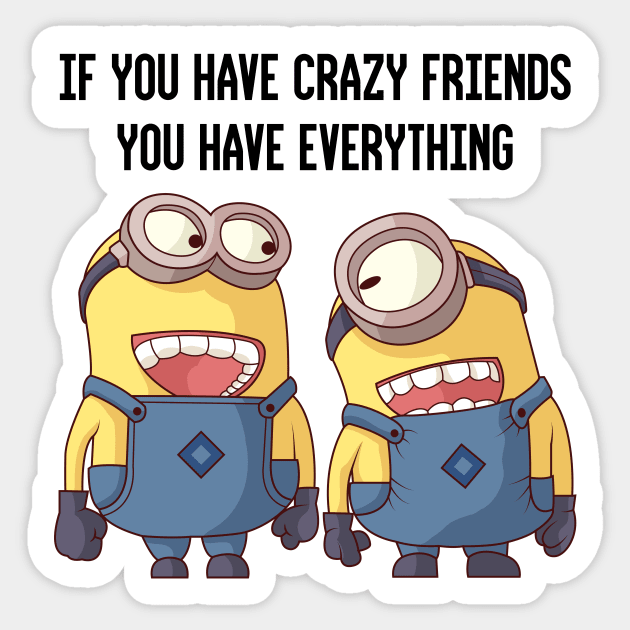I'm a bit giddy.
Despite all the problems and troubles and obstacles of everyday life right now, I'm getting to fulfill a lifelong dream. I'm getting to work on a show that is a genuine legend of musical theatre, known by most musical theatre people only through its tragically incomplete cast album, because nobody ever produces it.
Flashback. When I arrived at college in 1982, I found out within a few days that the Harvard bookstore was called The Coop (short for The Harvard Cooperative Society), and it was a massive, multi-floor, two-building department store -- including the largest record department in New England!
When they told me that, I almost wet myself. My inner drama nerd swooned.
It was thanks to the Coop that I discovered March of the Falsettos, Little Shop of Horrors, The Baker's Wife, They're Playing Our Song, The Robber Bridegroom, Fiorello!, Celebration, The Threepenny Opera, Leonard Bernstein's Mass, Anyone Can Whistle and all the other Sondheim shows -- and Promenade.
Every time I bought a new cast recording, I listened to it obsessively for weeks. And then I discovered Boston had a bunch of excellent used record stores, and none of them knew how valuable their cast albums were. I was helpless to resist. When I graduated, I realized I had acquired an average of one hundred cast recordings per year while I was at college. When I graduated high school, I had one hundred cast albums; four years later I had five hundred. All on LP.
Promenade thrilled me when I first put it on the stereo. It was so playful and silly and really funny, and yet the lyrics had a weirdly dark, cynical edge to them. Who were these characters? I fell in love with the score, even though the recording is only about two-thirds of the show, even though I knew nothing about the show itself.
(One funny aside, in order to fit more songs on the LP, they sped all the songs up just a little, which made all the voices a little higher. I never even noticed until I listened to the CD and heard how it's supposed to sound.)
Years later, I found the Promenade script reprinted in a collection called Great Rock Musicals. (No offense to the collection's editor -- Promenade is many things, but it's not a rock musical.)
So I read the script. Twice. And I still had no fucking idea what was going on. But it was awfully funny! Plus, I reminded myself, I felt the same way about Hair the first time I read that script.
It wasn't until years later when I was writing theatre books, that I did further research into Promenade; and as a result, into the Cuban-American book and lyric writer María Irene Fornés, who was a major figure in Sixties theatre; into Theatre of the Absurd; into composer Al Carmines and the off off Broadway theatre he created, Judson Poets Theatre; and into the off off Broadway scene where Promenade was born.
The more I learned, the more I wanted to work on this show.
Year after year, as we talked about programming New Line's next season, Promenade was forever my personal Questing Beast. I knew we could never produce it because it was just too risky "commercially," but I really wanted to work on it. More than that, it was so outrageously, relentlessly special that I wanted to share it with people.
Then, about a year ago, as we planned this season, I called Chris Moore, our associate artistic director and told him it was time for Promenade. This show was initially about 1965 America when it debuted at the Judson Poets Theatre, and then it was expanded and became about a pretty different 1969 America when it opened off Broadway. But as it often is with great works of art, suddenly it felt, last year and still now, like Promenade is about America today.
Chris made the totally legit point that New Line is awfully wobbly financially right now, and that maybe we should be producing shows that we know will "sell" really well, instead of a lesser known 1969 experimental musical comedy with a strange title. He was absolutely right, of course. But if New Line can't do what it was meant to do, why bother? Every show in this season, Bat Boy, Broadway Noir Deux, Promenade, and We Will Rock You all speak to this moment -- regardless of when they were created. That's what New Line does.
A few months ago, our audiences were stunned at how much the twenty-five-year-old show Bat Boy seems like it's about America in 2025. A few months earlier, they were stunned by how the fifty-year-old Rocky Horror felt like it was written yesterday. You'll be even more stunned by Promenade for all the same reasons. But that's what New Line was created to do.
No, that's what theatre was created to do.
And surely the best way to look at the darkest aspects of our current zeitgeist is through humor. A spoonful of sugar, as they say. We have to face the darkness in order to understand it. But in the hands of Fornés and Carmines, that task is a little easier and a little less scary. And a lot funnier.
But trust me, though you'll laugh throughout the show, you'll be thinking about it afterward for a loooooong time. It's sneaky that way.
For most people, this is literally a once-in-a-lifetime chance to see this brilliant, crazy, rule-changing, absurdist masterpiece of musical theatre. I know we say this a lot, but more than ever, there is nothing else remotely like this show. It scares the shit out of me as director! But we can't wait to share it with you!
The adventure continues...
Long Live the Musical!
Scott
P.S. To get your tickets for Promenade, click here.
P.P.S. To check out my newest musical theatre books, click here.
P.P.P.S. To donate to New Line Theatre, click here.
BROADWAY NOIR DEUX!
It won't surprise many people when I say that I often drive my collaborators crazy in various ways. For instance, when someone brings an idea to me, especially if it's not something I've thought about before, I need to take it in, then let it percolate. It swims around in the back of my head and at some point, I realize that it's either a great idea or a terrible idea. Sometimes the percolating takes minutes, sometimes weeks or even longer.
Por ejemplo...
It was two years ago, during the run of my seriously fucked-up Christmas musical, Jesus and Johnny Appleweed's Holy Rollin' Family Christmas, and I was spending a lot of time sitting in the lobby with Chris Moore, New Line's associate artistic director. And one night, Chris said, "We should do a show that's all black people singing the songs they never get to sing in shows."
Chris and I talk a lot about issues around race and representation in musical theatre. New Line has been assembling diverse casts for its entire history -- it's incredibly rare that a New Line show has an all-white cast. But as a middle-aged white dude on the cusp between the Boomers and Generation X, it's important to me that New Line never becomes middle-aged and that our cast and staff always look like our community.
That night, Chris' comment didn't get an immediate response from me, but it surely did start percolating...
After the show, Chris was standing in the aisle talking to some of our friends. I walked up to him and said, "You know, we've been doing these concerts at the Sheldon every few years. We should do your idea at the Sheldon!" We explained the idea to the others, and everybody thought it sounded great.
We toyed around with various titles, many of which were very funny but totally inappropriate. I can't remember for sure, but I think it was Chris who suggested we call it Broadway Noir. It was the perfect title. For me, using a French word evoked Josephine Baker, the black American singer and dancer who in the 1920s could only become a star in Paris. It also just sounded cool.
I decided that night that we would produce Broadway Noir at the Sheldon Concert Hall in January 2025. And totally out of character for me (still a recovering control freak), I told Chris that I would probably suggest things, songs, etc., but this was his concert. He curated the song list, and he directed the show.
And people loved it. Despite an awful snow storm, the two performances drew nice big crowds. We saw a lot of our regular audience there, but also a lot of new people. And the reaction from everybody was so positive, that we decided to do a sequel and make this second one a part of our regular season, not just a special event.
Of course -- also at Chris' suggestion -- we called the sequel Broadway Noir Deux! (To be fair, I added the exclamation point. To me, it's both fierce and funny.) And once again, Chris has assembled the cast, directed the show, and curated the song list with the concert's music director Jermaine Manor.
The fun for me is threefold. First, I don't have to do any work on this! Second, I get to see actors who've done shows with us take on something really different. For instance, this time, DeAnté Bryant, who played Will in New Line's American Idiot, is taking on the classic 1945 song, "If I Loved You," Rodgers and Hammerstein's soaring ballad of barely hidden emotion from Carousel. It couldn't be further from American Idiot. That's what's so cool about these concerts of ours.
Corrinna Redford played Mimi in Rent with New Line last season. I loved working with her. I loved watching her navigate the enormous range of intense emotions that Mimi suffers through. I also loved that sometimes she would come up to me and ask to change my blocking or direction, and she'd explain her reasoning behind the change -- and almost every time, her change made the moment or the scene better. She has killer instincts. In Broadway Noir Deux!, she jumps into something completely different, Jeanine Tesori's playful "Morning Person" from Shrek.
The incorrigible Kimmie Kidd played the outrageous, glamorous, hilarious French movie producer Liliane LeFleur in New Line's production of Nine. One of my favorite moments in the show was when Kimmie got to invoke LeFleur's Folies Bergeres performances. She was funny, naughty, sexy, and it was great fun working with her. In a stroke of genius, Chris has given Kimmie "Climb Every Mountain," from Rodgers and Hammerstein's The Sound of Music. It's oceans away from the playful carnality of Liliane LeFleur, and it will be such a treat to see it.
During our run of Rent, Chris and I had several conversations about how terrific Aaron Tucker was in the role of Benny. It was the first Rent I've seen in which Benny isn't a dick. He's just an adult. And let's be honest, Roger and Mark really are just slackers, right? This was the first time I liked Benny, and I understood more deeply his position, caught between his child-like friends and his desire to lead an adult life. After the scene with the homophobic pastor at the church, Benny and Tom exited with their arms around each other. I loved that. I am thrilled that in our concert, Aaron is going to sing "Johanna" from Stephen Sondheim's masterpiece Sweeney Todd. Aaron's got a beautiful voice!
Victoria Pines first worked with us way back in 2001 on the amazing 1937 musical The Cradle Will Rock. She most recently worked with us in Sweet Potato Queens. She's an incredibly versatile, honest performer and her voice can pretty much do anything. In Sweet Potato Queens, she broke our hearts every night with "Cherries in the Snow." But in New Line's Best Little Whorehouse in Texas, Victoria played Jewel and she brought the fucking house down every night with the joyous, raunchy "Twenty Four Hours of Lovin'." When Chris told me Victoria was going to sing Kander and Ebb's torchy "Maybe This Time" in the concert, I was thrilled. She will nail it.
I just met Ronmal Mottley a few months ago, as we started rehearsals for Bat Boy. He's new to our company, but he easily proved himself as both the loudmouth Mrs. Taylor and the nurturing Reverend Hightower. I remember calling him to cast him in Bat Boy, and I made sure he knew one of his roles would be in drag. Without a pause he said, "That's cool. I'm up for anything." Keep this guy around. He's also in both our upcoming shows, the weird but wonderful Promenade in March, and We Will Rock You in June. For Broadway Noir Deux!, Ronmal is singing Jason Robert Brown's gorgeous ballad, "Wondering," from The Bridges of Madison County. After the insanity of Bat Boy and the coming insanity of Promenade, it's so cool to give Ronmal a song like this.
Though I haven't worked with De-Rance Blaylock yet, I know she's a really great performer, and I LOVE that Chris has given her Sondheim's "The Ladies Who Lunch," from Company, one of the all-time great musical theatre character songs.
I haven't worked with the others in the cast, but I can't wait to hear them all. Chris and Jermaine did such a wonderful job last year, I know this year will be awesome too.
One of the reasons I love doing concerts of theatre songs at the Sheldon is that normally, people hear these songs in context, and they're thinking about story, sets, jokes, music. Concerts like this allow the songs to shine by themselves, to let us really listen to the lyrics. Most of us humans are primarily visually oriented, and if you give our brains a choice between visuals and some other sense, like hearing, the visuals will win the attention war. So for these concerts, we take everything else away. It's just the performers, the songs, and you.
Besides, the Sheldon is world-renowned for its acoustics. Singing there is a huge joy all its own. And when we can share wonderful theatre songs at the same time, it's doubly awesome.
And let's not forget the original reason for these Noir concerts. Though diversity in musical theatre casting is getting better and better over time, there are still lots of directors and others who can't imagine a black woman playing Sally Bowles, and can't imagine a black man playing Billy Bigelow or Anthony Hope. It's stupid. And these extraordinary local performers are the proof.
Por ejemplo...
It was two years ago, during the run of my seriously fucked-up Christmas musical, Jesus and Johnny Appleweed's Holy Rollin' Family Christmas, and I was spending a lot of time sitting in the lobby with Chris Moore, New Line's associate artistic director. And one night, Chris said, "We should do a show that's all black people singing the songs they never get to sing in shows."
Chris and I talk a lot about issues around race and representation in musical theatre. New Line has been assembling diverse casts for its entire history -- it's incredibly rare that a New Line show has an all-white cast. But as a middle-aged white dude on the cusp between the Boomers and Generation X, it's important to me that New Line never becomes middle-aged and that our cast and staff always look like our community.
That night, Chris' comment didn't get an immediate response from me, but it surely did start percolating...
After the show, Chris was standing in the aisle talking to some of our friends. I walked up to him and said, "You know, we've been doing these concerts at the Sheldon every few years. We should do your idea at the Sheldon!" We explained the idea to the others, and everybody thought it sounded great.
We toyed around with various titles, many of which were very funny but totally inappropriate. I can't remember for sure, but I think it was Chris who suggested we call it Broadway Noir. It was the perfect title. For me, using a French word evoked Josephine Baker, the black American singer and dancer who in the 1920s could only become a star in Paris. It also just sounded cool.
I decided that night that we would produce Broadway Noir at the Sheldon Concert Hall in January 2025. And totally out of character for me (still a recovering control freak), I told Chris that I would probably suggest things, songs, etc., but this was his concert. He curated the song list, and he directed the show.
And people loved it. Despite an awful snow storm, the two performances drew nice big crowds. We saw a lot of our regular audience there, but also a lot of new people. And the reaction from everybody was so positive, that we decided to do a sequel and make this second one a part of our regular season, not just a special event.
Of course -- also at Chris' suggestion -- we called the sequel Broadway Noir Deux! (To be fair, I added the exclamation point. To me, it's both fierce and funny.) And once again, Chris has assembled the cast, directed the show, and curated the song list with the concert's music director Jermaine Manor.
The fun for me is threefold. First, I don't have to do any work on this! Second, I get to see actors who've done shows with us take on something really different. For instance, this time, DeAnté Bryant, who played Will in New Line's American Idiot, is taking on the classic 1945 song, "If I Loved You," Rodgers and Hammerstein's soaring ballad of barely hidden emotion from Carousel. It couldn't be further from American Idiot. That's what's so cool about these concerts of ours.
Corrinna Redford played Mimi in Rent with New Line last season. I loved working with her. I loved watching her navigate the enormous range of intense emotions that Mimi suffers through. I also loved that sometimes she would come up to me and ask to change my blocking or direction, and she'd explain her reasoning behind the change -- and almost every time, her change made the moment or the scene better. She has killer instincts. In Broadway Noir Deux!, she jumps into something completely different, Jeanine Tesori's playful "Morning Person" from Shrek.
The incorrigible Kimmie Kidd played the outrageous, glamorous, hilarious French movie producer Liliane LeFleur in New Line's production of Nine. One of my favorite moments in the show was when Kimmie got to invoke LeFleur's Folies Bergeres performances. She was funny, naughty, sexy, and it was great fun working with her. In a stroke of genius, Chris has given Kimmie "Climb Every Mountain," from Rodgers and Hammerstein's The Sound of Music. It's oceans away from the playful carnality of Liliane LeFleur, and it will be such a treat to see it.
During our run of Rent, Chris and I had several conversations about how terrific Aaron Tucker was in the role of Benny. It was the first Rent I've seen in which Benny isn't a dick. He's just an adult. And let's be honest, Roger and Mark really are just slackers, right? This was the first time I liked Benny, and I understood more deeply his position, caught between his child-like friends and his desire to lead an adult life. After the scene with the homophobic pastor at the church, Benny and Tom exited with their arms around each other. I loved that. I am thrilled that in our concert, Aaron is going to sing "Johanna" from Stephen Sondheim's masterpiece Sweeney Todd. Aaron's got a beautiful voice!
Victoria Pines first worked with us way back in 2001 on the amazing 1937 musical The Cradle Will Rock. She most recently worked with us in Sweet Potato Queens. She's an incredibly versatile, honest performer and her voice can pretty much do anything. In Sweet Potato Queens, she broke our hearts every night with "Cherries in the Snow." But in New Line's Best Little Whorehouse in Texas, Victoria played Jewel and she brought the fucking house down every night with the joyous, raunchy "Twenty Four Hours of Lovin'." When Chris told me Victoria was going to sing Kander and Ebb's torchy "Maybe This Time" in the concert, I was thrilled. She will nail it.
I just met Ronmal Mottley a few months ago, as we started rehearsals for Bat Boy. He's new to our company, but he easily proved himself as both the loudmouth Mrs. Taylor and the nurturing Reverend Hightower. I remember calling him to cast him in Bat Boy, and I made sure he knew one of his roles would be in drag. Without a pause he said, "That's cool. I'm up for anything." Keep this guy around. He's also in both our upcoming shows, the weird but wonderful Promenade in March, and We Will Rock You in June. For Broadway Noir Deux!, Ronmal is singing Jason Robert Brown's gorgeous ballad, "Wondering," from The Bridges of Madison County. After the insanity of Bat Boy and the coming insanity of Promenade, it's so cool to give Ronmal a song like this.
Though I haven't worked with De-Rance Blaylock yet, I know she's a really great performer, and I LOVE that Chris has given her Sondheim's "The Ladies Who Lunch," from Company, one of the all-time great musical theatre character songs.
I haven't worked with the others in the cast, but I can't wait to hear them all. Chris and Jermaine did such a wonderful job last year, I know this year will be awesome too.
One of the reasons I love doing concerts of theatre songs at the Sheldon is that normally, people hear these songs in context, and they're thinking about story, sets, jokes, music. Concerts like this allow the songs to shine by themselves, to let us really listen to the lyrics. Most of us humans are primarily visually oriented, and if you give our brains a choice between visuals and some other sense, like hearing, the visuals will win the attention war. So for these concerts, we take everything else away. It's just the performers, the songs, and you.
Besides, the Sheldon is world-renowned for its acoustics. Singing there is a huge joy all its own. And when we can share wonderful theatre songs at the same time, it's doubly awesome.
And let's not forget the original reason for these Noir concerts. Though diversity in musical theatre casting is getting better and better over time, there are still lots of directors and others who can't imagine a black woman playing Sally Bowles, and can't imagine a black man playing Billy Bigelow or Anthony Hope. It's stupid. And these extraordinary local performers are the proof.
Join us this weekend at the Sheldon for Broadway Noir Deux! What could be better than sitting in an historic concert hall, listening to wonderful actors singing wonderful theatre songs? To me, that's pretty much heaven. And a great way to start the new year.
2026 just has to be better than 2025... right?
Long Live the Musical!
Scott
P.S. To get your tickets for Broadway Noir Deux!, click here.
P.P.S. To get tickets for the other shows in the season, click here.
P.P.P.S. To check out my newest musical theatre books, click here.
P.P.P.P.S. To donate to New Line Theatre, click here
2026 just has to be better than 2025... right?
Long Live the Musical!
Scott
P.S. To get your tickets for Broadway Noir Deux!, click here.
P.P.S. To get tickets for the other shows in the season, click here.
P.P.P.S. To check out my newest musical theatre books, click here.
P.P.P.P.S. To donate to New Line Theatre, click here
'Twas a Year Full of New Line, 2025
'Twas a year full of New Line, still lurching toward stable;
Our budget's quite tight, but we do what we're able.
They say that we all have to suffer for art,
But the making of art is the easier part;
It's the bowing and scraping and begging for money,
To pay for the art and the artists to run free;
We suffer alright, and that suff'ring ain't done, G...
The Missouri Arts Council, which once we could trust,
Decided to yank all their funding from us!
For thirty-three years, they had funded New Line,
Now they've blacklisted us, to send us a sign:
Our founding philosophy makes them so sad,
'Cause we value diversity; they think that's bad.
See, Missouri's a red state -- and stark raving mad!
We started the year going back to the Sheldon;
Our Broadway Noir concert was 'specially well-done --
Performers of color recaptured the show tune,
In dazzling displays, like a big Broadway typhoon!
So eye-op'ning, mind-blowing, gob-smacking too,
For these much gifted artists, their message came through --
Just let them, and they'll show you what they can do!
What a joy to return to the Frankenstein Place,
And a re-mounting of Rocky Horror, to face
All the horrors of Now, when our world is so mad,
To remind us that differences aren't always bad,
That queer folks and trans folks and other non-normies
Are just like the rest of us, so we perform these
Subversive rock tuners with important stories.
 It was more than a decade since we last did Rent,
It was more than a decade since we last did Rent,
But these times, they demanded a cry of dissent
Against hatred and bias and misinformation
That slices and dices our nattering nation;
So Roger and Mark and their friends all returned
To remind us again what we each should have learned,
That empathy's how our humanity's earned.
We brought back the Bat Boy for one final time,
'Cause we need the reason inside of his rhyme,
'Cause we need reminding that scapegoating sucks,
'Cause morality, decency both are in flux.
It's now that we need what our musicals do,
Reveal the real world, with a fictional skew,
To show us the truth 'bout ourselves that breaks through.
Yes, New Line has lasted for thirty-four years,
Through poverty, challenges, setbacks, and tears,
But we're all still plugging along, as we do,
To bring all the quirkiest, best shows to you,
With Promenade's wacky, insightful satire,
And We Will Rock You, full of Queen's rockin' fire,
Plus more of the musical art you inspire.
Stay Sane and Safe, and Have a Happy New Year!
Long Live the Musical!
Scott
P.S. I started these year-poems on a whim way back in 2013. If you're a glutton for punishment, here are my poems from 2013, 2014, 2015, 2016, 2017, 2018, 2019, 2020, 2022, 2023, and 2024. (Yes, I skipped 2021.)
P.P.S. To buy tickets to our 2026 shows, Broadway Noir DEUX!, Promenade and We Will Rock You, click here.
P.P.P.S. If you'd like to contribute to New Line Theatre (you know you would!), just click here.
Our budget's quite tight, but we do what we're able.
They say that we all have to suffer for art,
But the making of art is the easier part;
It's the bowing and scraping and begging for money,
To pay for the art and the artists to run free;
We suffer alright, and that suff'ring ain't done, G...
The Missouri Arts Council, which once we could trust,
Decided to yank all their funding from us!
For thirty-three years, they had funded New Line,
Now they've blacklisted us, to send us a sign:
Our founding philosophy makes them so sad,
'Cause we value diversity; they think that's bad.
See, Missouri's a red state -- and stark raving mad!
We started the year going back to the Sheldon;
Our Broadway Noir concert was 'specially well-done --
Performers of color recaptured the show tune,
In dazzling displays, like a big Broadway typhoon!
So eye-op'ning, mind-blowing, gob-smacking too,
For these much gifted artists, their message came through --
Just let them, and they'll show you what they can do!
What a joy to return to the Frankenstein Place,
And a re-mounting of Rocky Horror, to face
All the horrors of Now, when our world is so mad,
To remind us that differences aren't always bad,
That queer folks and trans folks and other non-normies
Are just like the rest of us, so we perform these
Subversive rock tuners with important stories.

But these times, they demanded a cry of dissent
Against hatred and bias and misinformation
That slices and dices our nattering nation;
So Roger and Mark and their friends all returned
To remind us again what we each should have learned,
That empathy's how our humanity's earned.
We brought back the Bat Boy for one final time,
'Cause we need the reason inside of his rhyme,
'Cause we need reminding that scapegoating sucks,
'Cause morality, decency both are in flux.
It's now that we need what our musicals do,
Reveal the real world, with a fictional skew,
To show us the truth 'bout ourselves that breaks through.
Yes, New Line has lasted for thirty-four years,
Through poverty, challenges, setbacks, and tears,
But we're all still plugging along, as we do,
To bring all the quirkiest, best shows to you,
With Promenade's wacky, insightful satire,
And We Will Rock You, full of Queen's rockin' fire,
Plus more of the musical art you inspire.
Stay Sane and Safe, and Have a Happy New Year!
Long Live the Musical!
Scott
P.S. I started these year-poems on a whim way back in 2013. If you're a glutton for punishment, here are my poems from 2013, 2014, 2015, 2016, 2017, 2018, 2019, 2020, 2022, 2023, and 2024. (Yes, I skipped 2021.)
P.P.S. To buy tickets to our 2026 shows, Broadway Noir DEUX!, Promenade and We Will Rock You, click here.
P.P.P.S. If you'd like to contribute to New Line Theatre (you know you would!), just click here.
The 2025 New Line Theatre Gift Guide is Here!
Happy Holidays from The Bad Boy of Musical Theatre! We're here again to help you find the perfect gift for that musical theatre fanboy or fangirl on your list who has everything! Tickets, calendars, books, and more!
 Broadway Meets STL Rhythm, Passion, Style
Broadway Meets STL Rhythm, Passion, StyleFor two nights only, Jan. 9-10, the New Liners return to the acoustically magnificent Sheldon Concert Hall in the Grand Center Arts District. BROADWAY NOIR DEUX!, features a cast of all local actors of color, sharing with you a powerhouse celebration of Broadway musicals through the lens of their own lives, staking their claim to this most American art form, and reminding us that the Broadway musical belongs to all of us.
Click here to buy tickets.
 Come
for the Party!
Come
for the Party! Stay for the War!
Don't miss your once-in-a-lifetime chance to see this uproarious experimental musical comedy from 1969! Beneath its dizzying comedy and catchy songs, PROMENADE follows the exploits of two escaped prisoners taking an unexpected tour of Capitalism and The Big City, where the poor and homeless mingle with the Idle Rich, exploring some big issues along the way, like wealth inequality, law and order, war, corruption, body image, gender, sexuality, and more.
Click here to buy tickets.
 Will You Do the Fandango?
Will You Do the Fandango?New Line Theatre wraps up its 34th season with the global sensation, the electrifying rock adventure WE WILL ROCK YOU, a fantastical rock fable featuring 24 songs by QUEEN! Set in a futuristic, post-apocalyptic dystopia, WE WILL ROCK YOU follows two revolutionaries on their mission to save rock and roll. In an age where algorithms control our every choice, this musical is a rallying cry for our times, a fist-pumping, foot-stomping anthem to individuality.
Click here to buy tickets.
Bring Great Musical Theatre to our City!
Make a Year-End Donation to New Line!
Donate in the name of your favorite fanboy or fangirl. Donate in the memory of a loved one. Donate in honor of the teacher who turned you on to musicals. Donate in the name of your parents who drove you to rehearsals. Donate in Memory of Sondheim. Or just get an extra year-end tax deduction!
Just Click Here!
New Line Theatre is a 501(c)(3) nonprofit organization.
 New
Line's 2025-26
New
Line's 2025-26Photo Calendar
Every year, we produce a wall calendar with high-quality photos from our shows by Jill Ritter Photography. Enjoy gorgeous production photos from some of New Line's coolest shows, Rocky Horror, American Idiot, Something Rotten, Dracula, Lizzie, Anything Goes, A Funny Thing Happened on the Way to the Forum, Johnny Appleweed, Sweet Potato Queens, Return to the Forbidden Planet, and Jesus & Johnny Appleweed's Holy Rollin' Christmas!
 The
Poster Art of
The
Poster Art ofNew Line Theatre
Yes that's right, we've published a coffee table book of all our posters over the last thirty-three years, all designed by St. Louis graphic artists Kris Wright, Matt Reedy, and others. It's a fun look back over New Line's amazing, unique history, and the company's first hundred shows. It's perfect for lovers of New Line and anyone who loves poster art, available now in hardcover and softcover editions.
 New Line's "First Hundred Shows" Poster
New Line's "First Hundred Shows" PosterOne 36" x 24" poster that includes all the posters from New Line's first one hundred musicals (plus six Sheldon concerts). Get your Poster of Posters today!
New Line Bumper Stickers
 Collect 'em all!
Collect 'em all!Go See a Musical;
Make Musicals, Not War;
got musicals?;
Bat Boy for Prez;
or the New Line logo.
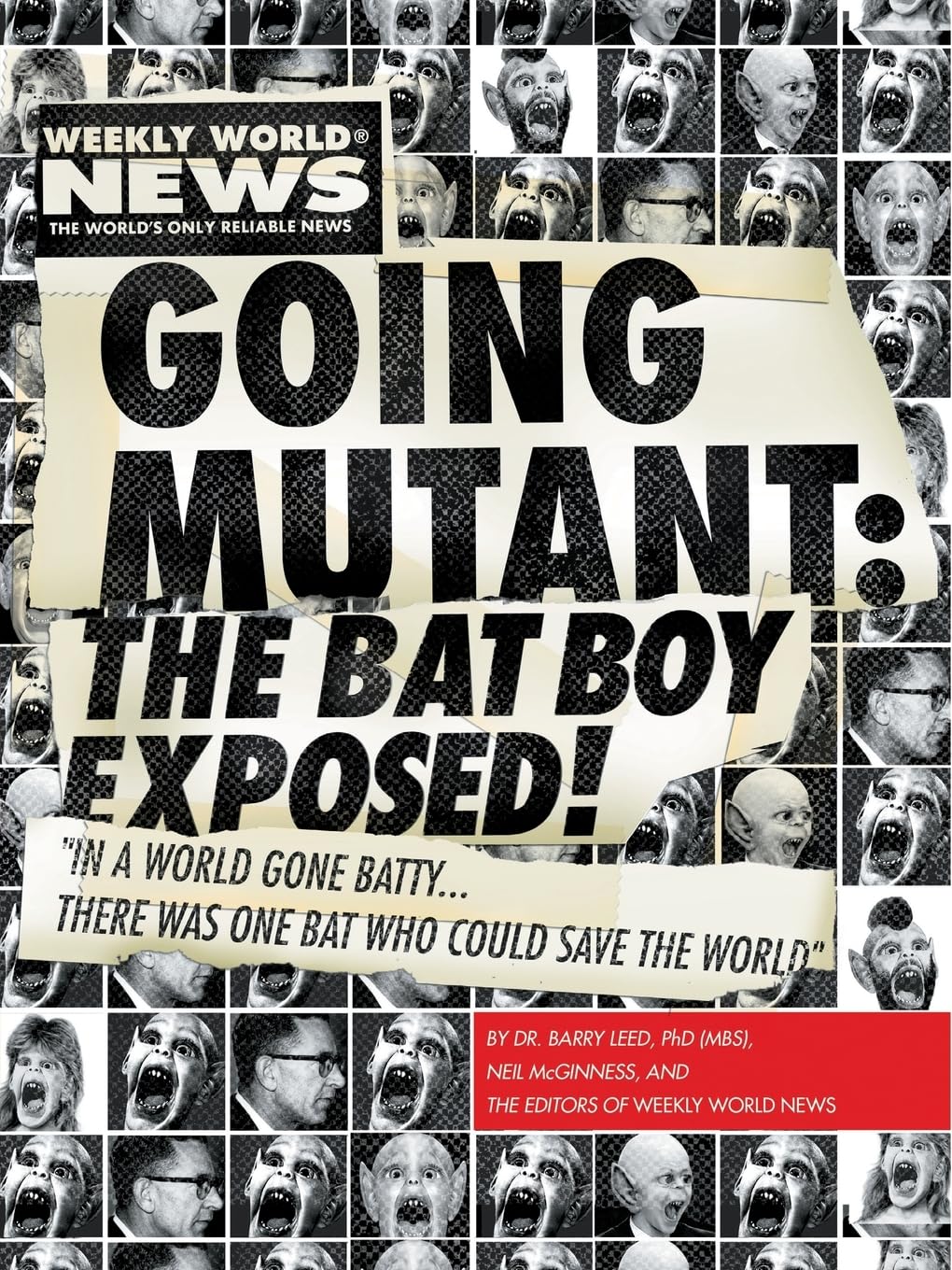 Bat
Boy
Bat
BoyYou loved seeing Bat Boy on our stage -- and we loved sharing it with you! Now you just can't get enough of him, right? No problem! We've got you covered.
Get ALL the Weekly World News articles about the Bat Boy, all in one crazy volume, Going Mutant!
Or how about a volume of the craziest WWN articles ever, Bat Boy Lives!
 La Vie Boheme!
La Vie Boheme!the RENT novel
You saw Rent last season, but have you read the novel? People say the musical is based on the opera La Boheme, but it's much closer to Henri Murger's very funny, very truthful 1851 French novel about young artists, Scenes de la Vie de Boheme, now in an all-new, easier-to-read English translation! Every character from Rent has a parallel character in this original version of the story. Especially if you know Rent, you'll love this book!
 Rocky Horror
Rocky HorrorOur audiences went crazy over our production of The Rocky Horror Show! For those of you who already knew the show, and for those who've just discovered it...
Get yourself the new 50th anniversary coffee table book, Rocky Horror: Featuring Unseen Photographs and Exclusive Interviews!
AND
Also the new Official Rocky Horror Late Night Double Feature: The 50th Anniversary Two-Volume Collector's Edition
 The
Wonderful Music of BOZZ
The
Wonderful Music of BOZZThe new novel from Artistic Director Scott Miller, a fairy tale for the new millennium! In a dark world without music and without empathy, drama nerds Shellie and JoJo, and their new traveling companions, carry the fate of humankind on their artsy teenage shoulders. Can a musical save the world?
When L. Frank Baum first published The Wonderful Wizard of Oz, he wrote in his introduction, "The old time fairy tale, having served for generations, may now be classed as 'historical' in the children's library; for the time has come for a series of newer 'wonder tales' in which the stereotyped genie, dwarf and fairy are eliminated, together with all the horrible and blood-curdling incidents devised by their authors to point a fearsome moral to each tale." Baum wrote that in 1900. Miller thinks the time has come again.
 JESUS & JOHNNY APPLEWEED'S HOLY ROLLIN' FAMILY CHRISTMAS
JESUS & JOHNNY APPLEWEED'S HOLY ROLLIN' FAMILY CHRISTMASYou loved this wild, vulgar, rowdy, outrageous, and hilarious musical satire in 2023. Now you can get the script and the vocal selections for yourself and for your nastier-minded friends!
“What if Seth Rogen, Charles Dickens, Andrew Lloyd Webber, Cheech and Chong, Christopher Hitchens, Hunter S. Thompson, and John Waters decided to have a baby?” – KDHX
"A pot-laced, Dickensian, Cheech & Chong-esque holiday spoof that is reminiscent of Saturday Night Live in its heyday." – BroadwayWorld
"A snarky (and oddly charming) holiday event." – TalkinBroadway
"Resembles the audacious dark comedy material that John Waters and Charles Busch specialize in." – PopLifeSTL
 The ABCs of BROADWAY MUSICALS series
The ABCs of BROADWAY MUSICALS seriesThese terrific books from New Line artistic director Scott Miller are a series of fun, easy-to-read books, a totally not intimidating way to get a basic understanding of this most American of art forms, including a very brief history of musicals, a survey of important and well-known shows, examples of the wide and wild variety of musicals, a look at the amazing people who create musicals, and a sense of how Broadway musicals reflect and comment on our culture. You’ll never feel lost again in a conversation about musical theatre, and you’ll enjoy seeing musicals more than ever. These books are short enough to read in one sitting or you can flip open to any page and find something interesting. Even hardcore musical lovers may learn something from these little books! Now available -- The ABCs of Broadway Musicals; The ABCs of Acting in Musicals; The ABCs of Directing Musicals; and The ABCs of Writing Musicals.
REPRINTS!
So many interesting books and scripts have fallen into public domain lately, so it's possible to reprint them at long last. Here are just a few gems that are back in print after many decades out of print!
42nd Street, the novel
Go Into Your Dance, the novel
Stage Mother, the novel
Oh! James!, the novel that inspired No, No, Nanette
No No Nanette, the original 1925 script
The Fantasticks, the original play
Liliom, the play that inspired Carousel
A Day Well Spent, the play that inspired The Matchmaker and Hello, Dolly!
Sondheim & Grimm & Perrault, the original fairy tales that inspired Into the Woods
Twenty Years on Broadway, George M. Cohan's memoir
 BROADWAY MUSICAL
BROADWAY MUSICALCHRISTMAS CAROLS
A piano-vocal songbook, full of 25 well-loved Christmas carols refashioned by Scott Miller for the hard-core fan of Broadway musicals, in new vocal arrangements with all-new lyrics related to musical theatre – funny, serious, smartass, cynical, reverent, poignant songs that will make you laugh, that will make you think, that will remind you why you love musicals so much.
The songs include “O Little Shop of Bethlehem,” “God Rest Ye, Mad Thenardiers,” “Away in a Mame Tour,” “I Heard You Screlt On Christmas Day,” “What Squip Is This,” “Here We Come A-Chorusing,” “O Come, All Ye Rent Heads,” “Jolly Old Steve Sondheim,” “Shrek, the Herald Angel, Sings,” “O Hamilton,” and other future classics.
 ANYTHING,
ANYTHING, ANYTHING GOES! A Deep Dive
ANYTHING,
ANYTHING, ANYTHING GOES! A Deep DiveWe all get a kick out of Anything Goes. Find out why. One of the most performed musicals in history, Anything Goes has become a classic of the American theatre, and yet most people don't really understand the show and its wild mashup of musical comedy, screwball comedy, and gangster movies. Far from being an old-fashioned, old-school musical comedy, Anything Goes is a razor-sharp satire of America, as much about today as about the Thirties, the way we make celebrities out of criminals and make religion into show biz. It's irreverent, smartass, insightful, fearless, and very funny. Plus, it's got some of Cole Porter's best songs.
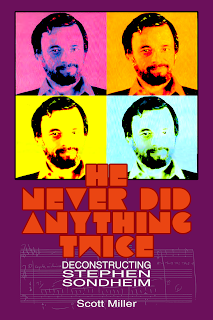 HE
NEVER DID ANYTHING TWICE
HE
NEVER DID ANYTHING TWICEGet ready for a mind-blowing trip through the Broadway musicals of the most fearless and influential artist in the history of the American musical theatre, Stephen Sondheim. Here are sixteen in-depth explorations of all the great Sondheim musicals, West Side Story, Gypsy, A Funny Thing Happened on the Way to the Forum, Anyone Can Whistle, Evening Primrose, Company, Follies, A Little Night Music, The Frogs, Pacific Overtures, Sweeney Todd, Merrily We Roll Along, Sunday in the Park with George, Into the Woods, Assassins, and Passion; plus some brief stops at a few of his other musical and non-musical projects over the years.
 GO GREASED LIGHTNING!
GO GREASED LIGHTNING!The Amazing Authenticity of Grease
So many people underestimate the intelligence and authenticity of Grease. So it’s time to set the record straight. Originally a rowdy, rebellious, piece of alternative theatre, written by two guys who really lived it, Grease was inspired by the rule-busting success of Hair, rejecting the happy trappings of Broadway for a more authentic, more visceral, more radical theatre experience. It’s an authentic snapshot of the end of the 1950s, a moment when the styles and culture of the disengaged and disenfranchised became overpowering symbols of teenage power and independence.
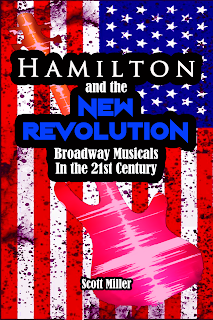 HAMILTON
AND THE NEW REVOLUTION:
HAMILTON
AND THE NEW REVOLUTION: Broadway Musicals in the 21st Century
How lucky we are to be alive right now! With this new volume, musical theatre scholar, director, historian, and fanboy Scott Miller takes you on a phantasmagorical journey through the second decade of this millennium, every stop along the way a Broadway musical truly like no other, all of them brilliant, original, and unique, all pointing toward an even brighter future for the art form and all the young artists creating amazing new work for us every day in this Golden Age for the musical theatre, including Hamilton, Dear Evan Hansen, A Strange Loop, Hadestown, The Color Purple, Bonnie & Clyde, Hands on a Hardbody, and The Scottsboro Boys, all shows that break the rules in smart, fearless, and surprising ways.
 LET
THE SUN SHINE IN:
LET
THE SUN SHINE IN: The Genius of HAIR
In 1967, Hair launched a revolution. It rejected every convention of Broadway, of traditional theatre in general, and of the American musical specifically. It paved the way for the nonlinear concept musicals that dominated American musical theatre forever after. With more regional productions of Hair than ever before, Scott Miller gives us an incisive and fascinating analysis of the show. He looks at its place in theatre and cultural history, and its impact on recent musicals, including Rent. He delves into the mystical power Hair has over performers and viewers alike and its ability to literally change lives today -- including his.
 RESCUING CATS:
RESCUING CATS: The Musical That's Better Than You Think
No matter how you approach it, Cats is so much more than a silly dance revue based on some silly poems, so much more than a punchline. Why has Cats been such a huge, longstanding commercial success around the world? Why do people see it over and over? Cats is literally about life and death. Cats is about us. Scott Miller takes another revelatory deep dive into this overly maligned but iconic musical, to see how it was made, what it's about, why it works, why so many people love it and so many people hate it. If you love Cats, you'll find here so much more to love. If you hate Cats, this book might just change your perspective a little.
 SEX,
DRUGS, ROCK & ROLL, and MUSICALS
SEX,
DRUGS, ROCK & ROLL, and MUSICALSMore deep dives into ten musicals that engage with sex, drugs, and rock & roll in one way or another, from the artistic earthquake that was Hair to punk pop that is Hedwig and the Angry Inch. These are all shows that New Line has produced over the company's history, including The Wild Party, Grease, Hair, Jesus Christ Superstar, The Rocky Horror Show, The Best Little Whorehouse in Texas, I Love My Wife, Bat Boy, Hedwig and the Angry Inch, and High Fidelity.
 STRIKE
UP THE BAND
STRIKE
UP THE BANDThe whole history of musicals, pulling back the curtain on the amazing innovation and adventurousness of the art form, its political and social conscience, and its incredibly rapid evolution over the last century. Strike Up the Band focuses not only on what happened on stage but also on how, and why it matters to us today. Its a different kind of history that explores the famous and, especially, the not-so famous musicals to reveal the lineage that paved the way to contemporary musicals.
 LITERALLY
ANYTHING GOES
LITERALLY
ANYTHING GOESAnother musical theatre book from Scott Miller that takes deep dives into more than a dozen incredible, quirky musicals spanning the history of our art form, all shows that New Line has produced, including The Threepenny Opera, Anything Goes, The Nervous Set, The Fantasticks, Zorbá, Two Gentlemen Of Verona, The Robber Bridegroom, Evita, Return to the Forbidden Planet, Kiss Of The Spider Woman, A New Brain, Reefer Madness, Bukowsical, and Love Kills. Nobody does deep, insightful, penetrating analysis of musicals like Miller does.
 IDIOTS,
HEATHERS, and SQUIPS
IDIOTS,
HEATHERS, and SQUIPSIn this volume, Miller takes you on a short but fantastic journey through the first decade and a half of the new millennium, guided by deep dives into eleven of the musicals that represent the astonishing variety and fearlessness of this new Golden Age, including bare, Urinetown, Sweet Smell of Success, Jerry Springer the Opera, Passing Strange, Cry-Baby, Next to Normal, Bloody Bloody Andrew Jackson, American Idiot, Heathers, and Be More Chill, all shows that opened in this new century, presented in chronological order so you can see how our art form is evolving like never before.
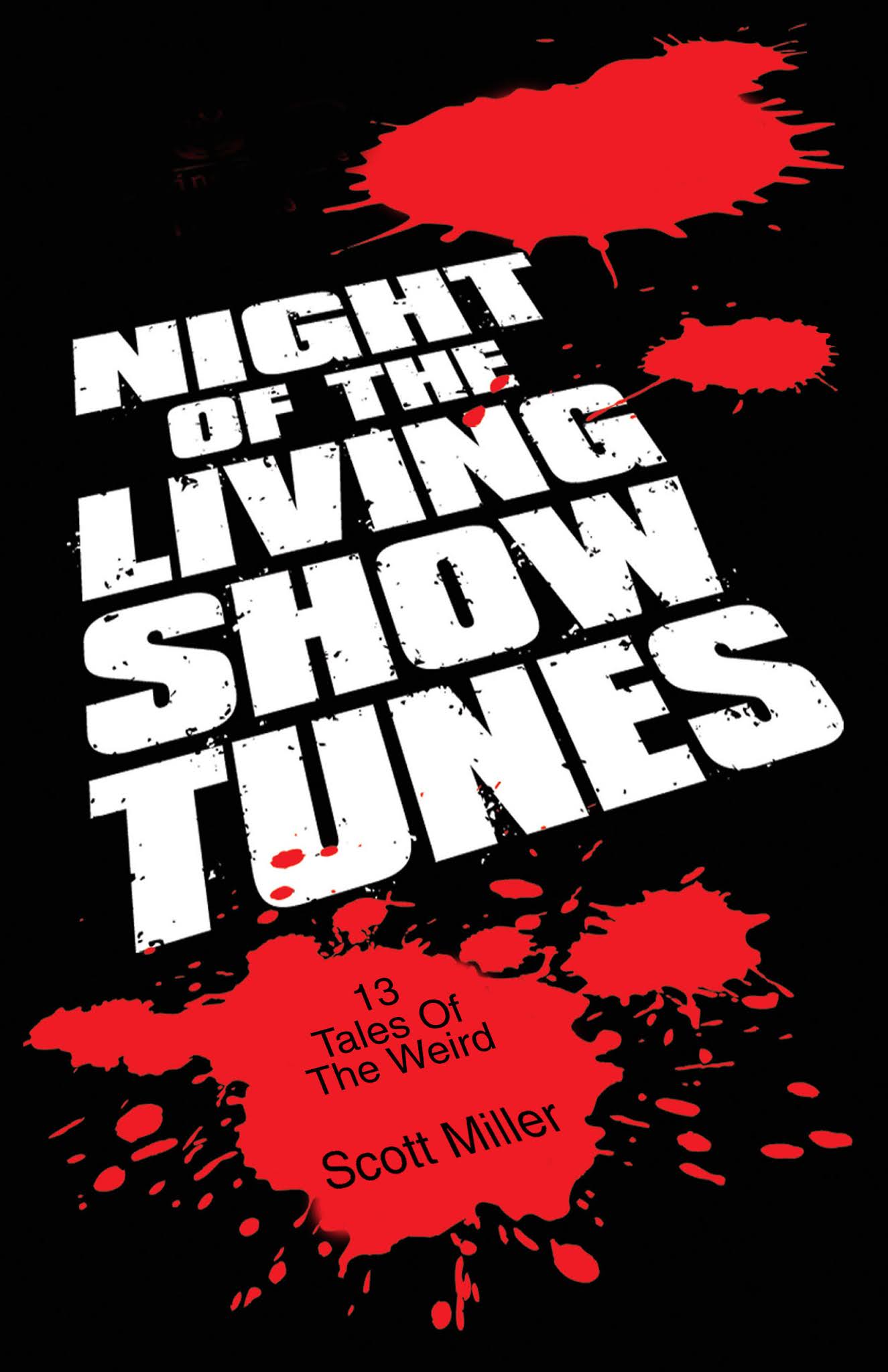 NIGHT
OF THE LIVING SHOW TUNES: 13 Tales of the Weird
NIGHT
OF THE LIVING SHOW TUNES: 13 Tales of the WeirdThe short story anthology that takes you on a roller coaster ride of thirteen nightmarish tales, all inspired in one way or another by the musical theatre, mashing together the history of musicals with the conventions and mad variety of the horror genre. You’ll meet theatre ghosts, vampires, monsters big and small, child killers, a homicidal maniac or two, a demon-possessed keyboard, and much more. The stories include "Tomorrow, Daddy," "Nothing More," "Night of the Festival," "Scarily We Roll Along," "Time Steps," "Requiem for Musical Comedy," "Happy Birthday, Robert," "I Had a Dream," "The Spellbinder," "A Little Fight Music," "The Farm Hand," "Over Finian’s Rainbow," and "The Flibbertijibbet." You’ll never think about musicals the same way again!
 THE
ZOMBIES OF PENZANCE
THE
ZOMBIES OF PENZANCEYes, available now on Amazon, New Line's 2018 monster hit, The Zombies of Penzance, which the RFT called "a delightmare"! No more just a beloved if mildly unsettling memory, now you can bring those dancing and singing Zombies and Major-General Stanley's zombie hunting daughters all back to life -- death? -- with the Zombies of Penzance script, the full piano-vocal score, and the live original cast recording of the show, featuring the St. Louis cast and your favorite New Liners, recorded live in performance at the Marcelle Theater!
"A wonderful whirlwind of apocalyptic delight."
-- Tanya Seale, BroadwayWorld
Nominated for the American Theatre Critics Association's 2018 New Play Award!
 THEATRE CATS:
THEATRE CATS: The Old Producer's Book of Dramatical Cats
In T.S. Eliot’s famous collection of poems, Old Possum’s Book of Practical Cats, the basis for the megahit Andrew Lloyd Webber musical Cats, Eliot observed and made fun of the habits and behavior of everyday people, through the comic and insightful metaphor of some very human-like cats. In Scott Miller and Zachary Allen Farmer’s new collection, the targets are more specific but just as wickedly true-to-life, as Miller and Farmer explore the behavior of the quirky, eccentric, fascinating types who make musical theatre, this time through the lens of some very artsy cats, the good, the bad, and the finicky. And you can sing these new poems to the Lloyd Webber score...
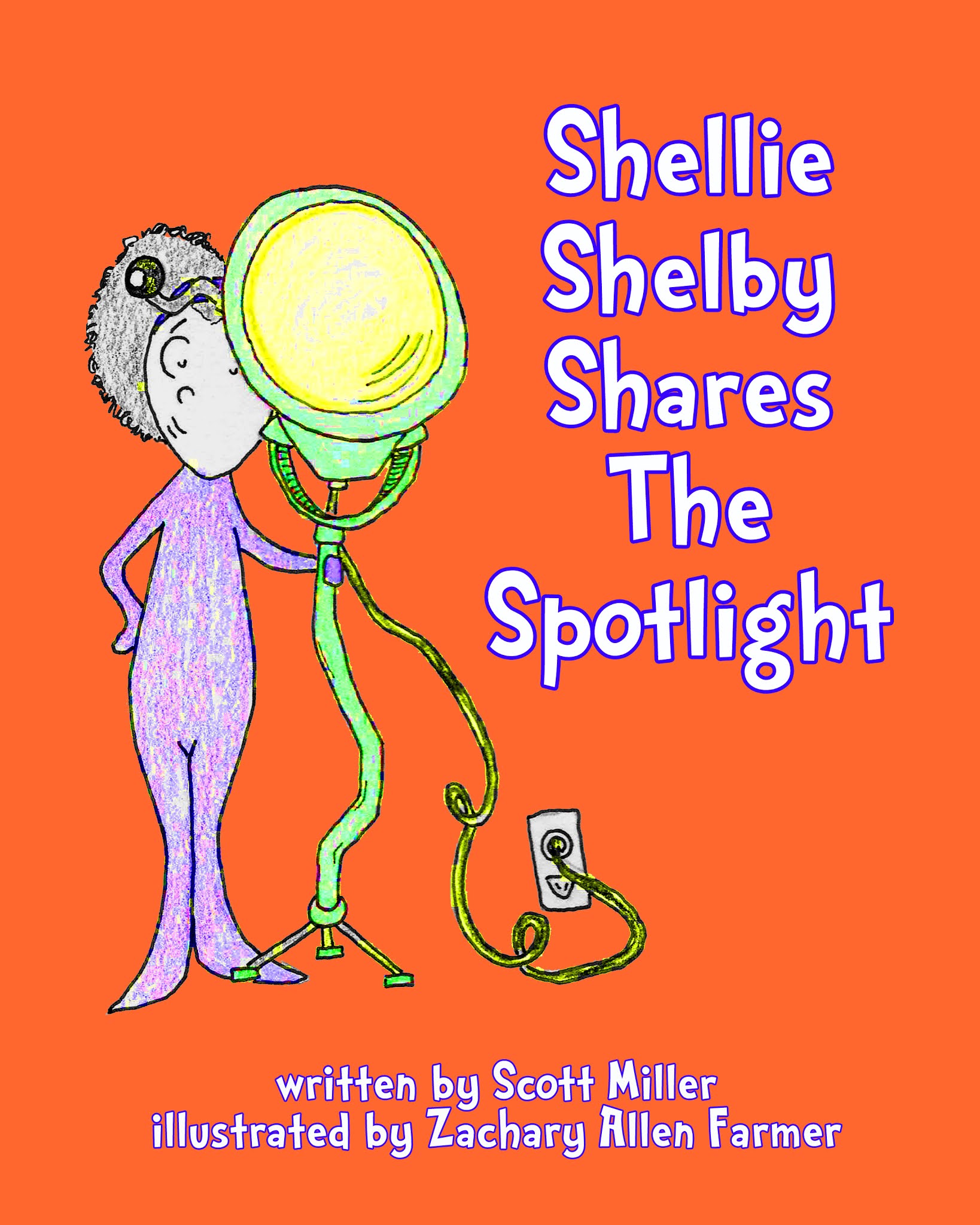 SHELLIE
SHELBY SHARES THE
SHELLIE
SHELBY SHARES THESPOTLIGHT
The picture book you never knew you needed, in which Dr. Seuss meets 42nd Street, as freshman Shellie Shelby embarks on a wild adventure through the treacherous social jungle of her first high school musical. When Shellie gets cast in the school show, she can’t believe her luck, but her best friend, poor tone-deaf JoJo McQuill, isn’t so lucky. Can she successfully navigate the drama club mean girls, her crazy philosopher-teacher, music rehearsals, killer choreography, and Tech Week, without losing her mind and her best friend in the process? Written by Scott Miller, with original illustrations by longtime New Line Theatre actor Zachary Allen Farmer.
That's it -- your 2025 Gift Guide. We hope it's helpful. And we hope your holidays are good ones, that lots of wonderful art comes into your life, and that you join us in 2026 for some more truly wonderful shows!
Happy Holidays!
Long Live the Musical!
Scott
P.S. Stay tuned -- on New Year's Eve, I'll post my 12th annual year-end poem looking back on The Year in New Line!
Christian Charity
This is the third time I'm directing Bat Boy. A couple nights before we opened, our intern Aiden asked me if I've learned anything new this third time. I couldn't think of anything specific.
And then it hit me. I've always thought of this story as one about bigotry and religious hypocrisy. But it's both bigger and simpler than that.
It's about fear.
It's about that famous saying of Yoda's, "Fear is the path to the dark side. Fear leads to anger. Anger leads to hate. Hate leads to suffering." That's what happens in Bat Boy. That's also what's been happening in the Trump era.
Like the town in Stephen Sondheim’s Anyone Can Whistle, Hope Falls, the setting for Bat Boy, is a town in crisis, in other words, it's America 2025 in miniature. The town's primary industry, coal mining, is gone, and the people of Hope Falls have turned to ranching, at which they really do not excel. All their cattle are dying because they don’t know how to raise cattle (“A mountain’s no place to raise cows,” the finale reminds us), but rather than acknowledge their own inadequacies, they look for a scapegoat.
Edgar shows up in town and they get their scapegoat. The ranchers fear financial ruin, which leads to anger, which leads to hate (they all sing, "Kill the Bat Boy!"), and that hate leads to quite a bit of suffering.
In the process, these characters palpably evoke our crippled country right now. One of the many problems with our broken politics today is the idea that I must win and you must lose -- that politica are a war now instead of argument and compromise and solutions. Blame is how I win. Whether it's true or not, it seems the one who blames first wins the battle.
It's a terrible way to run our country or a town of five hundred.
Bat Boy satirizes misinformation and disinformation, religious extremism and hypocrisy, and also religion as a misused socio-political force; but it doesn’t poke fun at Christianity itself or at people of genuine faith. The people of Hope Falls frequently proclaim their “Christian Charity,” but it’s clear from their behavior that they aren’t nearly as Christian as they claim to be. It seems everyone in town loves exclaiming “Sweet wounded Jesus!” when they’re surprised, and yet one would assume that serious Christians wouldn't take the Lord’s name in vain on such a regular basis.
The townspeople initially blame the death of their cows on God. They also talk about doing horrible things to Edgar and later, they threaten Dr. Parker, all the while pretending that their actions reflect their “Christian charity.”
You may disagree but this is 21st century American Christianity.
The song “Comfort and Joy” shows how misguided the people of Hope Falls (and America) are. 2nd Corinthians 1:23-24 says, “Our strength and ability are owing to faith; and our comfort and joy must flow from faith.” But these people are asking God to give them comfort and joy outright. They’ve got it backwards; they don’t understand that joy comes from faith, which they don’t have. They believe their comfort and joy will result from the destruction of an innocent life. They sing:
On the other hand Meredith has it right. She sings:
Out of context, that could be Jesus' disciples talking about how the priests and the pharisees will react to Jesus -- fear, hate, suffering. Edgar the Bat Boy is explicitly a Christ-like figure throughout the story.
It’s significant that Meredith better understands the teachings of the Bible and that she alone in Hope Falls practices actual Christian charity by insisting on caring for Edgar, by teaching him, by making him a part of the family. In the first dialogue scene in the show, Meredith even quotes Romans 6:23 at Shelley: “For the wages of sin is death…”, though she conveniently (comically) leaves out the more positive rest of the sentence.
In this story, the wages of sin are death, and maybe Meredith’s past and present circumstances lead her in that direction unconsciously. In this world of faux Christians, only Edgar sincerely seeks God, first praying to him in “Comfort and Joy,” then hoping for divine healing at the revival meeting, then in his testimony before the congregation. Edgar believes that God can help him.
Of course, he's wrong.
The people of Hope Falls -- and America in 2025 -- practice a poisoned, hypocritical brand of Christianity that has corrupted American culture today, and because this is the only kind of Christianity Edgar experiences, it prevents Edgar from finding God as he had hoped.
It’s also significant that the one explicitly religious figure in the show, the Reverend Hightower, is not a source of satire. He accepts Edgar without reservation. Even though the people of Hope Falls have asked the Reverend to come to town for all the wrong reasons (the cows), he’s still there hoping to do some good. And like Meredith, he accepts Edgar unconditionally. The Reverend Hightower, the one genuine Christian in the story, invites Edgar up on stage to be healed and urges the congregation to accept him, to assimilate him into the community. And though they are initially willing, their misplaced fear and hatred are easily revived by Bat Boy's supervillain, Dr. Parker.
Like many American musicals before it, Bat Boy is a story about an Outsider who meets a Community; the Outsider must learn to assimilate into the Community or be removed, through death or banishment.
In Oklahoma!, Brigadoon, Guys and Dolls, Hello, Dolly!, Annie Get Your Gun, The Music Man, Hedwig, the heroes assimilate and become part of the community (and/or the chorus) by the end. But in Carousel, The King and I, Pal Joey, West Side Story, Hair, Evita, Passion, Sweeney Todd, Urinetown, Pippin, Cabaret, Rocky Horror, Bonnie & Clyde, the heroes cannot assimilate and must leave or be removed. In a few shows, with more than one hero, we get both outcomes, as in South Pacific, Show Boat, and The Wild Party.
In a few (usually satiric) cases, the community actually adjusts to accommodate the hero, as in The Threepenny Opera, How to Succeed in Business Without Really Trying, and Heathers.
By the end of Bat Boy's first act, we realize that Edgar the Bat Boy isn't the only outsider; in this story, the entire Parker family are the outsiders, and the question is whether Edgar and the Parkers can assimilate -- and maybe also, why would they want to? Hope Falls (i.e., America) is a really fucked up place.
In the era of concept musicals and rock musicals, the musical theatre stories have focused more on the hero, his struggle, his growth, his success or not, in shows like Company, Pippin, Dude, Jesus Christ Superstar, Follies, Chicago, Barnum, Sweeney Todd, Nine, Sunday in the Park with George, Passing Strange, Hamilton, A Strange Loop, and so many others. Bat Boy fits into this category as well.
Most of this stuff is under the surface, most of it the audience doesn't consciously recognize, but it's what makes this story so powerful, so recognizably truthful, and so deeply human.
Even the third time around, it has been such a joy to live inside this material for a few months. It's not just funny and big-hearted, it's also masterfully constructed, and that's part of why it's so powerful.
Bat Boy runs through October 25. Get your tickets!
Long Live the Musial!
Scott
And then it hit me. I've always thought of this story as one about bigotry and religious hypocrisy. But it's both bigger and simpler than that.
It's about fear.
It's about that famous saying of Yoda's, "Fear is the path to the dark side. Fear leads to anger. Anger leads to hate. Hate leads to suffering." That's what happens in Bat Boy. That's also what's been happening in the Trump era.
Like the town in Stephen Sondheim’s Anyone Can Whistle, Hope Falls, the setting for Bat Boy, is a town in crisis, in other words, it's America 2025 in miniature. The town's primary industry, coal mining, is gone, and the people of Hope Falls have turned to ranching, at which they really do not excel. All their cattle are dying because they don’t know how to raise cattle (“A mountain’s no place to raise cows,” the finale reminds us), but rather than acknowledge their own inadequacies, they look for a scapegoat.
Edgar shows up in town and they get their scapegoat. The ranchers fear financial ruin, which leads to anger, which leads to hate (they all sing, "Kill the Bat Boy!"), and that hate leads to quite a bit of suffering.
In the process, these characters palpably evoke our crippled country right now. One of the many problems with our broken politics today is the idea that I must win and you must lose -- that politica are a war now instead of argument and compromise and solutions. Blame is how I win. Whether it's true or not, it seems the one who blames first wins the battle.
It's a terrible way to run our country or a town of five hundred.
Bat Boy satirizes misinformation and disinformation, religious extremism and hypocrisy, and also religion as a misused socio-political force; but it doesn’t poke fun at Christianity itself or at people of genuine faith. The people of Hope Falls frequently proclaim their “Christian Charity,” but it’s clear from their behavior that they aren’t nearly as Christian as they claim to be. It seems everyone in town loves exclaiming “Sweet wounded Jesus!” when they’re surprised, and yet one would assume that serious Christians wouldn't take the Lord’s name in vain on such a regular basis.
The townspeople initially blame the death of their cows on God. They also talk about doing horrible things to Edgar and later, they threaten Dr. Parker, all the while pretending that their actions reflect their “Christian charity.”
You may disagree but this is 21st century American Christianity.
The song “Comfort and Joy” shows how misguided the people of Hope Falls (and America) are. 2nd Corinthians 1:23-24 says, “Our strength and ability are owing to faith; and our comfort and joy must flow from faith.” But these people are asking God to give them comfort and joy outright. They’ve got it backwards; they don’t understand that joy comes from faith, which they don’t have. They believe their comfort and joy will result from the destruction of an innocent life. They sing:
Comfort and joy,
Comfort and joy!
Kill the bat boy,
Kill the bat boy!
On the other hand Meredith has it right. She sings:
He will show them he’s not
What they’re terrified of.
He will show them a love
They can never destroy.
If we prove that they’re wrong,
They’ll come ‘round before long,
And we’ll all sing a song
Full of comfort and joy.
Out of context, that could be Jesus' disciples talking about how the priests and the pharisees will react to Jesus -- fear, hate, suffering. Edgar the Bat Boy is explicitly a Christ-like figure throughout the story.
It’s significant that Meredith better understands the teachings of the Bible and that she alone in Hope Falls practices actual Christian charity by insisting on caring for Edgar, by teaching him, by making him a part of the family. In the first dialogue scene in the show, Meredith even quotes Romans 6:23 at Shelley: “For the wages of sin is death…”, though she conveniently (comically) leaves out the more positive rest of the sentence.
In this story, the wages of sin are death, and maybe Meredith’s past and present circumstances lead her in that direction unconsciously. In this world of faux Christians, only Edgar sincerely seeks God, first praying to him in “Comfort and Joy,” then hoping for divine healing at the revival meeting, then in his testimony before the congregation. Edgar believes that God can help him.
Of course, he's wrong.
The people of Hope Falls -- and America in 2025 -- practice a poisoned, hypocritical brand of Christianity that has corrupted American culture today, and because this is the only kind of Christianity Edgar experiences, it prevents Edgar from finding God as he had hoped.
It’s also significant that the one explicitly religious figure in the show, the Reverend Hightower, is not a source of satire. He accepts Edgar without reservation. Even though the people of Hope Falls have asked the Reverend to come to town for all the wrong reasons (the cows), he’s still there hoping to do some good. And like Meredith, he accepts Edgar unconditionally. The Reverend Hightower, the one genuine Christian in the story, invites Edgar up on stage to be healed and urges the congregation to accept him, to assimilate him into the community. And though they are initially willing, their misplaced fear and hatred are easily revived by Bat Boy's supervillain, Dr. Parker.
Like many American musicals before it, Bat Boy is a story about an Outsider who meets a Community; the Outsider must learn to assimilate into the Community or be removed, through death or banishment.
In Oklahoma!, Brigadoon, Guys and Dolls, Hello, Dolly!, Annie Get Your Gun, The Music Man, Hedwig, the heroes assimilate and become part of the community (and/or the chorus) by the end. But in Carousel, The King and I, Pal Joey, West Side Story, Hair, Evita, Passion, Sweeney Todd, Urinetown, Pippin, Cabaret, Rocky Horror, Bonnie & Clyde, the heroes cannot assimilate and must leave or be removed. In a few shows, with more than one hero, we get both outcomes, as in South Pacific, Show Boat, and The Wild Party.
In a few (usually satiric) cases, the community actually adjusts to accommodate the hero, as in The Threepenny Opera, How to Succeed in Business Without Really Trying, and Heathers.
By the end of Bat Boy's first act, we realize that Edgar the Bat Boy isn't the only outsider; in this story, the entire Parker family are the outsiders, and the question is whether Edgar and the Parkers can assimilate -- and maybe also, why would they want to? Hope Falls (i.e., America) is a really fucked up place.
In the era of concept musicals and rock musicals, the musical theatre stories have focused more on the hero, his struggle, his growth, his success or not, in shows like Company, Pippin, Dude, Jesus Christ Superstar, Follies, Chicago, Barnum, Sweeney Todd, Nine, Sunday in the Park with George, Passing Strange, Hamilton, A Strange Loop, and so many others. Bat Boy fits into this category as well.
Most of this stuff is under the surface, most of it the audience doesn't consciously recognize, but it's what makes this story so powerful, so recognizably truthful, and so deeply human.
Even the third time around, it has been such a joy to live inside this material for a few months. It's not just funny and big-hearted, it's also masterfully constructed, and that's part of why it's so powerful.
Bat Boy runs through October 25. Get your tickets!
Long Live the Musial!
Scott
Subscribe to:
Comments (Atom)



